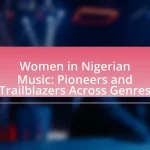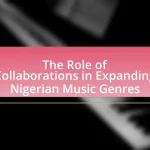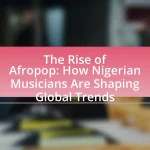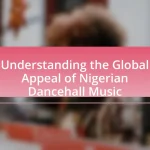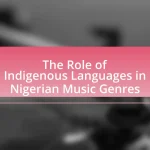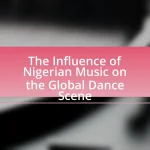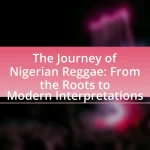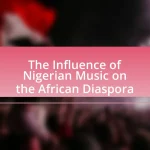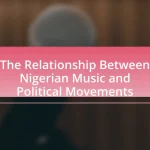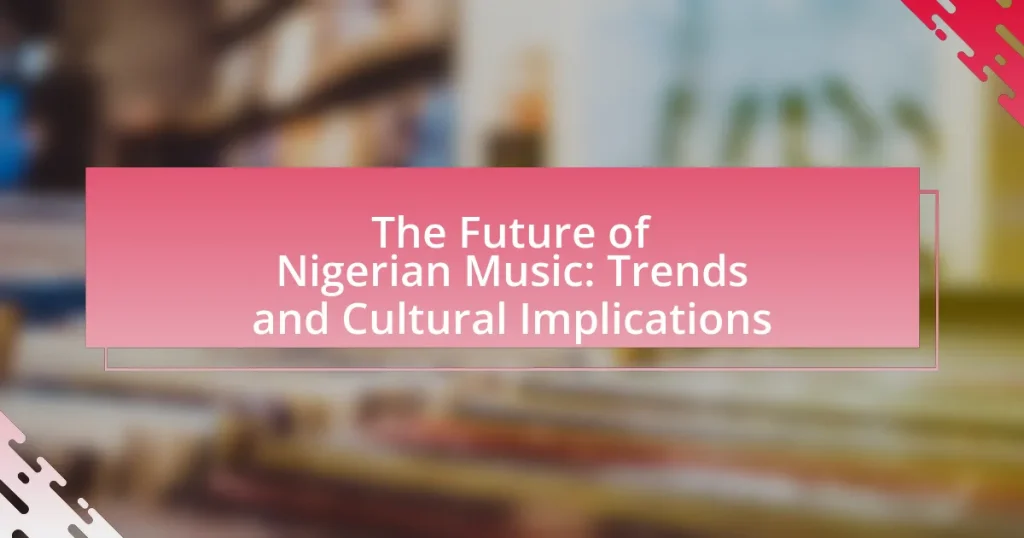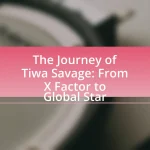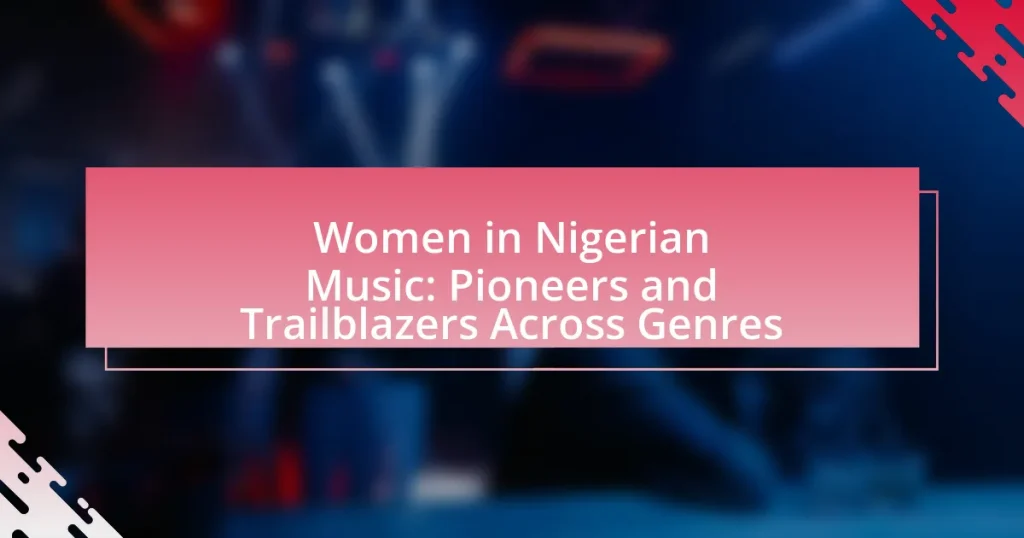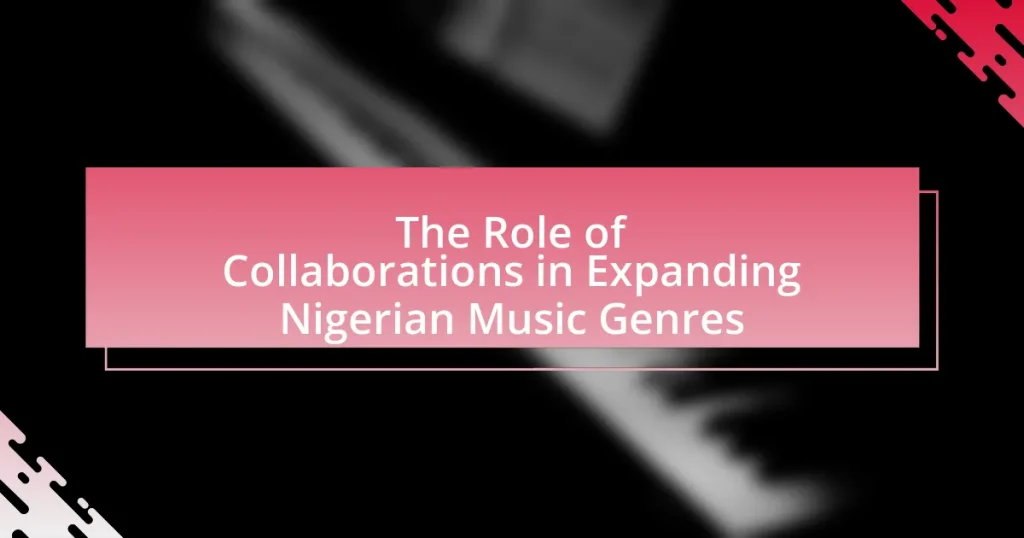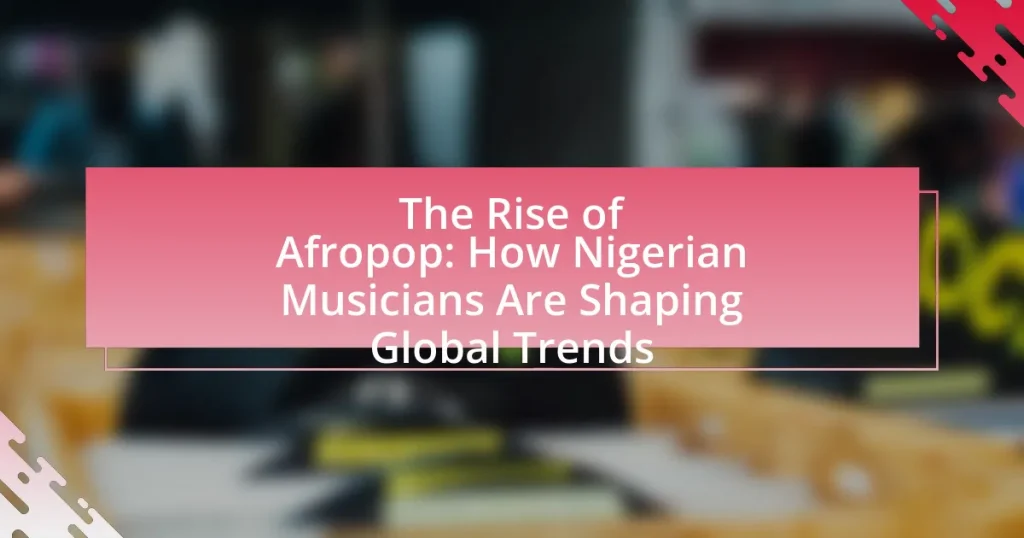The article focuses on the current trends and cultural implications of Nigerian music, highlighting the rise of Afrobeats as a dominant genre and its global recognition through artists like Burna Boy and Wizkid. It examines the influence of technology, particularly digital platforms and social media, on music production, distribution, and artist visibility. Additionally, the article discusses emerging genres, societal themes reflected in lyrics, and the challenges faced by the Nigerian music industry, such as piracy and inadequate infrastructure. It also explores opportunities for growth and strategies for artists to thrive in a competitive landscape.
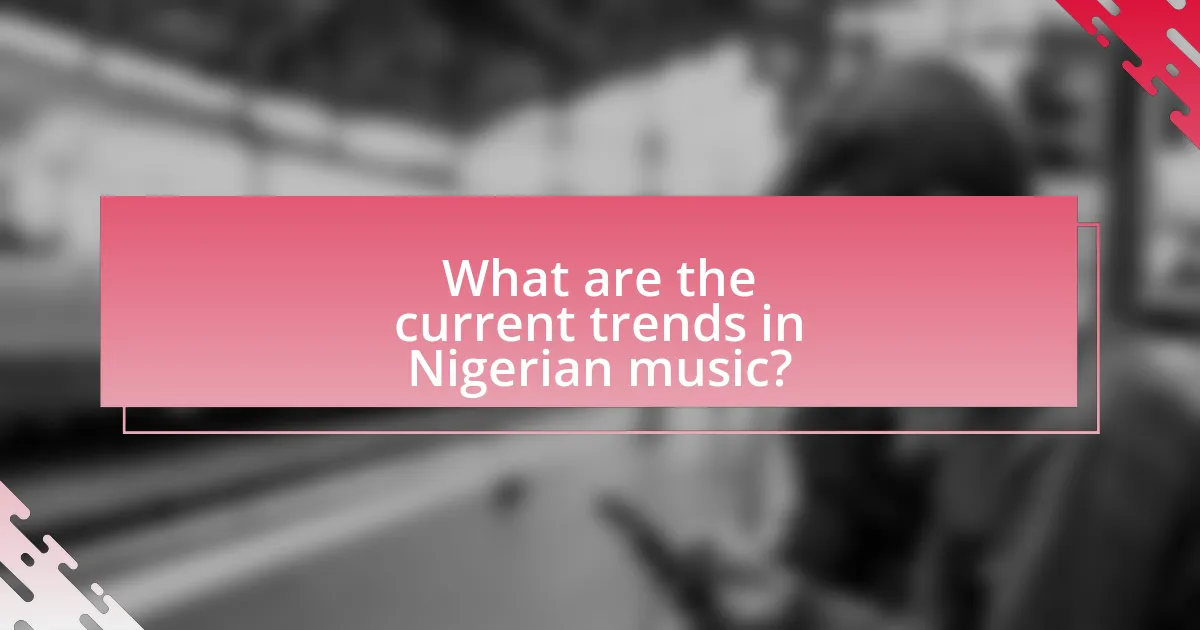
What are the current trends in Nigerian music?
Current trends in Nigerian music include the rise of Afrobeats as a dominant genre, the fusion of traditional sounds with contemporary styles, and increased global collaborations. Afrobeats has gained international recognition, with artists like Burna Boy and Wizkid achieving significant success on global charts, reflecting a growing audience for Nigerian music worldwide. Additionally, the incorporation of genres such as hip-hop, R&B, and dancehall into Nigerian music showcases the versatility and innovation of artists. The use of digital platforms for music distribution has also transformed how music is consumed, allowing for broader reach and engagement with fans.
How is technology influencing the evolution of Nigerian music?
Technology is significantly influencing the evolution of Nigerian music by enabling artists to produce, distribute, and promote their work more efficiently. The rise of digital audio workstations (DAWs) allows musicians to create high-quality recordings from home studios, reducing production costs and increasing accessibility. Additionally, streaming platforms like Spotify and Apple Music have transformed how music is consumed, allowing Nigerian artists to reach global audiences and gain international recognition. According to the International Federation of the Phonographic Industry (IFPI), Nigeria’s music industry revenue grew by 25% in 2020, largely driven by digital sales and streaming. This technological shift not only enhances the creative process but also fosters collaboration among artists across different genres and regions, further enriching the Nigerian music landscape.
What role do streaming platforms play in the distribution of Nigerian music?
Streaming platforms are crucial in the distribution of Nigerian music by providing artists with direct access to global audiences. These platforms, such as Spotify, Apple Music, and Boomplay, enable Nigerian musicians to upload their work and reach listeners without the need for traditional record labels. In 2021, Nigerian music streaming revenue grew by 25%, highlighting the increasing reliance on digital platforms for music distribution. This shift not only enhances visibility for local artists but also facilitates the global spread of Afrobeat and other genres, contributing to the international recognition of Nigerian music.
How are social media and digital marketing shaping artist visibility?
Social media and digital marketing significantly enhance artist visibility by providing platforms for direct engagement with audiences and targeted promotional strategies. Artists can leverage social media channels like Instagram, Twitter, and TikTok to showcase their work, connect with fans, and build a personal brand, which is crucial in the competitive music industry. For instance, a study by the International Federation of the Phonographic Industry (IFPI) in 2021 revealed that 70% of music listeners discover new artists through social media platforms. Additionally, digital marketing tools such as targeted ads and analytics allow artists to reach specific demographics, increasing their chances of gaining visibility in diverse markets. This combination of direct interaction and strategic promotion has transformed how artists are perceived and discovered, particularly in the evolving landscape of Nigerian music.
What genres are emerging in the Nigerian music scene?
Emerging genres in the Nigerian music scene include Afrobeats, Amapiano, and Trap music. Afrobeats has gained international recognition, blending traditional African rhythms with contemporary sounds, while Amapiano, originating from South Africa, is increasingly influencing Nigerian artists with its unique fusion of house and jazz elements. Additionally, Trap music is becoming popular among Nigerian youth, characterized by its rhythmic vocal style and heavy bass. The rise of these genres reflects the dynamic evolution of Nigeria’s music landscape, driven by cultural exchange and digital platforms that facilitate global reach.
How is Afrobeats evolving and what influences its growth?
Afrobeats is evolving through increased global recognition, collaboration with international artists, and the integration of diverse musical influences. The genre’s growth is influenced by the rise of digital streaming platforms, which have expanded its reach beyond Africa, allowing artists like Burna Boy and Wizkid to gain international audiences. Additionally, cultural exchanges and collaborations with genres such as hip-hop and dancehall have enriched Afrobeats, making it more appealing to a broader demographic. The genre’s evolution is also supported by social media, which facilitates viral trends and connects artists with fans worldwide, further driving its popularity and commercial success.
What new genres are gaining popularity among Nigerian youth?
Afrobeats and alternative R&B are gaining significant popularity among Nigerian youth. Afrobeats, characterized by its fusion of African rhythms and contemporary sounds, has seen a surge in global recognition, with artists like Burna Boy and Wizkid leading the charge. Alternative R&B, which incorporates elements of traditional Nigerian music with modern R&B influences, is also resonating with younger audiences, as seen in the rise of artists like Tems and Santi. This trend reflects a broader cultural shift towards embracing diverse musical influences while maintaining a strong connection to Nigerian heritage.
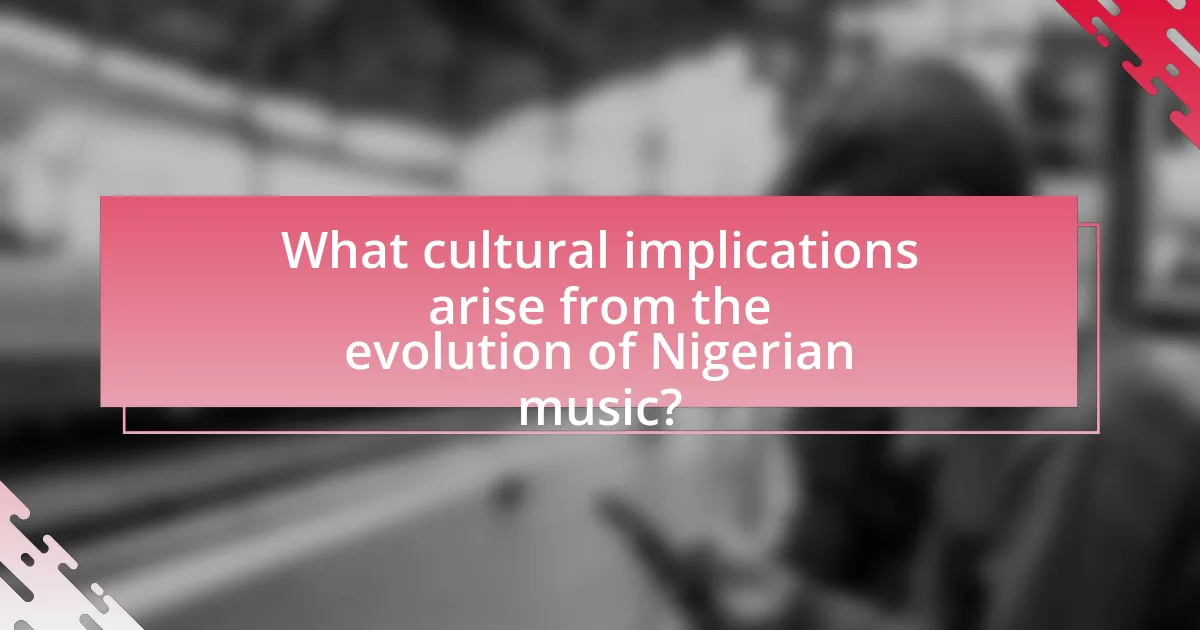
What cultural implications arise from the evolution of Nigerian music?
The evolution of Nigerian music has significant cultural implications, including the promotion of national identity and the fusion of diverse cultural elements. As genres like Afrobeats gain global recognition, they reflect Nigeria’s rich cultural heritage while also incorporating influences from various musical traditions, such as hip-hop and reggae. This blending fosters a sense of unity among different ethnic groups within Nigeria, as artists collaborate across cultural boundaries, exemplified by the success of artists like Burna Boy and Wizkid, who have achieved international acclaim. Furthermore, the rise of digital platforms has democratized music distribution, allowing for greater representation of local narratives and issues, thereby empowering artists to address social and political themes relevant to Nigerian society.
How does Nigerian music reflect societal changes?
Nigerian music reflects societal changes by addressing contemporary issues such as politics, social justice, and cultural identity. For instance, the rise of Afrobeat, popularized by artists like Fela Kuti, emerged as a response to political oppression and corruption in Nigeria during the 1970s and 1980s, highlighting the struggles of the populace. Additionally, modern genres like Afropop and hip-hop often incorporate themes of economic hardship, youth aspirations, and the quest for social change, resonating with the experiences of younger generations. The lyrics and rhythms of these musical styles serve as a mirror to the evolving societal landscape, showcasing the dynamic relationship between music and the cultural context in which it is created.
What themes are prevalent in contemporary Nigerian music?
Contemporary Nigerian music prominently features themes of love, social issues, cultural identity, and political commentary. Love songs often explore romantic relationships and emotional connections, reflecting personal experiences and societal norms. Social issues, including poverty, corruption, and inequality, are addressed in various genres, particularly in Afrobeat and hip-hop, where artists like Fela Kuti and Olamide use their platforms to critique societal injustices. Cultural identity is celebrated through the incorporation of indigenous languages, rhythms, and traditional instruments, fostering a sense of pride and connection to heritage. Political commentary is prevalent, with artists like Burna Boy and Wizkid addressing governance and activism, resonating with audiences who seek change. These themes collectively illustrate the dynamic landscape of contemporary Nigerian music, showcasing its role as a reflection of society and a catalyst for dialogue.
How do lyrics in Nigerian music address social issues?
Lyrics in Nigerian music address social issues by highlighting themes such as corruption, poverty, and human rights abuses. Artists like Fela Kuti and Burna Boy use their platforms to critique government policies and societal injustices, often drawing from personal experiences and historical contexts. For instance, Fela Kuti’s song “Zombie” critiques the Nigerian military’s brutality, while Burna Boy’s “Anybody” discusses the struggles of everyday life in Nigeria. These songs resonate with listeners, fostering awareness and prompting discussions about pressing social challenges.
In what ways does Nigerian music influence global culture?
Nigerian music influences global culture primarily through its unique rhythms, diverse genres, and the global popularity of Afrobeat. The incorporation of traditional African instruments and contemporary sounds in Nigerian music has led to a fusion that resonates with audiences worldwide, exemplified by artists like Burna Boy and Wizkid, who have achieved international acclaim. The rise of streaming platforms has facilitated the global reach of Nigerian music, with Afrobeat becoming a dominant genre in clubs and playlists across various countries. Additionally, collaborations between Nigerian artists and international musicians have further integrated Nigerian sounds into mainstream music, showcasing the cultural richness of Nigeria and promoting cross-cultural exchanges.
How are Nigerian artists collaborating with international musicians?
Nigerian artists are collaborating with international musicians through various platforms, including joint music projects, features on tracks, and participation in global music festivals. For instance, artists like Burna Boy and Wizkid have worked with global stars such as Beyoncé and Drake, respectively, enhancing their international reach and influence. These collaborations often blend genres, showcasing Afrobeat’s global appeal and leading to increased streaming numbers and chart success. The rise of digital platforms like Spotify and Apple Music has facilitated these partnerships, allowing for easier distribution and promotion of collaborative works.
What impact does Nigerian music have on global music trends?
Nigerian music significantly influences global music trends by introducing unique rhythms, genres, and cultural elements that resonate worldwide. The rise of Afrobeats, characterized by its fusion of traditional African sounds with contemporary genres, has led to increased collaborations between Nigerian artists and international musicians, exemplified by Burna Boy’s Grammy win and Wizkid’s collaborations with Drake and Beyoncé. This genre’s global popularity has resulted in a surge of interest in African music, prompting major music festivals to feature Nigerian artists prominently and leading to a broader acceptance of diverse musical styles in mainstream media.
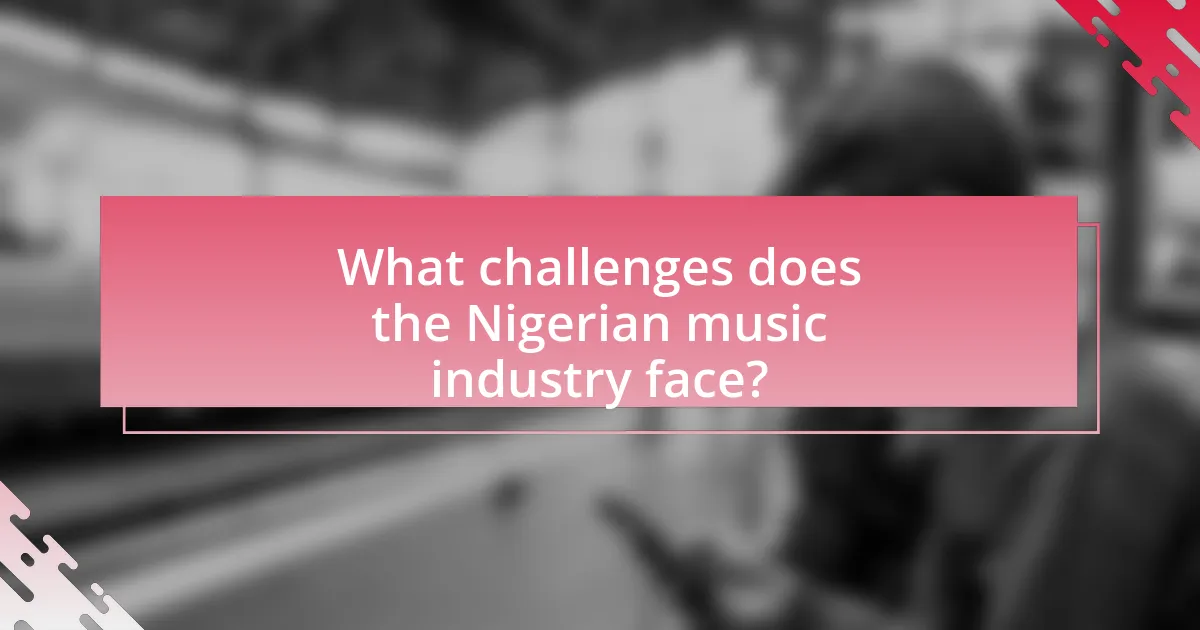
What challenges does the Nigerian music industry face?
The Nigerian music industry faces several significant challenges, including piracy, inadequate infrastructure, and limited access to funding. Piracy undermines artists’ revenue, with a 2019 report estimating that the industry loses approximately $1.3 billion annually due to illegal downloads and streaming. Inadequate infrastructure, such as poor internet connectivity and insufficient recording facilities, hampers the production and distribution of music. Additionally, limited access to funding restricts artists and producers from investing in high-quality production and marketing, which is crucial for competing on a global scale. These challenges collectively hinder the growth and sustainability of the Nigerian music industry.
How does piracy affect the revenue of Nigerian musicians?
Piracy significantly reduces the revenue of Nigerian musicians by undermining their ability to sell music legally. The prevalence of illegal downloads and unauthorized distribution channels leads to substantial financial losses; for instance, a report by the International Federation of the Phonographic Industry (IFPI) indicated that piracy costs the global music industry billions annually, with Nigeria being one of the hardest-hit countries in Africa. This loss of revenue not only affects individual artists but also hampers the overall growth of the Nigerian music industry, limiting investment in new talent and production.
What measures are being taken to combat music piracy in Nigeria?
The Nigerian government and music industry stakeholders are implementing several measures to combat music piracy. These measures include the establishment of the Copyright Commission, which enforces copyright laws and penalizes infringers, as well as collaborations with law enforcement agencies to conduct raids on illegal music vendors. Additionally, the industry is promoting digital distribution platforms that provide legal access to music, thereby reducing the appeal of pirated content. The Nigerian music industry has also engaged in awareness campaigns to educate the public about the negative impacts of piracy on artists and the economy. These initiatives are supported by statistics indicating that piracy significantly undermines revenue for artists, with estimates suggesting that the industry loses billions annually due to illegal downloads and sales.
How does the lack of infrastructure hinder the growth of the music industry?
The lack of infrastructure significantly hinders the growth of the music industry by limiting access to essential resources such as recording studios, distribution channels, and live performance venues. In Nigeria, for instance, inadequate power supply and poor transportation networks restrict artists’ ability to produce and promote their music effectively. According to a report by the World Bank, only about 60% of Nigerians have access to reliable electricity, which directly impacts the ability to operate recording studios and host events. Furthermore, without proper venues and logistics, artists struggle to reach audiences, resulting in diminished revenue opportunities and stunted industry growth.
What are the opportunities for growth in the Nigerian music sector?
The Nigerian music sector has significant opportunities for growth, primarily driven by digital distribution, international collaborations, and a burgeoning local audience. The rise of streaming platforms like Spotify and Apple Music has expanded access to Nigerian music globally, increasing revenue potential for artists. Additionally, collaborations with international artists can enhance visibility and market reach, as seen with Nigerian artists like Burna Boy and Wizkid achieving global recognition. Furthermore, the growing youth population in Nigeria, which constitutes over 60% of the population, presents a robust domestic market eager for diverse musical content. These factors collectively position the Nigerian music sector for substantial growth in the coming years.
How can emerging artists leverage technology for success?
Emerging artists can leverage technology for success by utilizing digital platforms for distribution, promotion, and engagement with audiences. These artists can distribute their music through streaming services like Spotify and Apple Music, which have democratized access to global audiences, allowing independent musicians to reach listeners without traditional record label support. Additionally, social media platforms such as Instagram and TikTok enable artists to promote their work, connect with fans, and create viral content that can significantly increase their visibility. According to a report by the International Federation of the Phonographic Industry (IFPI), 70% of music consumers discover new music through streaming platforms and social media, highlighting the importance of these technologies in an artist’s success.
What role do music festivals play in promoting Nigerian music?
Music festivals play a crucial role in promoting Nigerian music by providing a platform for artists to showcase their work to a diverse audience. These events facilitate exposure for both established and emerging musicians, helping to elevate their profiles nationally and internationally. For instance, festivals like the Lagos Jazz Series and the Felabration festival attract thousands of attendees, including international tourists, which enhances the visibility of Nigerian music genres such as Afrobeats and Highlife. Additionally, music festivals often feature collaborations between local and global artists, fostering cultural exchange and innovation within the Nigerian music scene. This dynamic not only boosts the local economy through tourism but also contributes to the global recognition of Nigerian music as a significant cultural force.
What best practices can artists adopt to thrive in the Nigerian music industry?
Artists can thrive in the Nigerian music industry by focusing on building a strong brand, leveraging social media for promotion, and collaborating with other artists. A strong brand identity helps artists stand out in a competitive market, while social media platforms like Instagram and TikTok provide cost-effective ways to reach a wider audience. Collaborations can enhance visibility and introduce artists to new fan bases, as seen with successful partnerships like Wizkid and Tems, which have led to international recognition. Additionally, understanding the local music landscape and engaging with fans through live performances and community events can further solidify an artist’s presence in the industry.
How can musicians effectively market themselves in a competitive landscape?
Musicians can effectively market themselves in a competitive landscape by leveraging social media platforms, engaging with their audience, and utilizing data analytics to tailor their promotional strategies. Social media platforms like Instagram, TikTok, and Twitter allow musicians to showcase their work, connect with fans, and build a personal brand. Engaging with the audience through live performances, Q&A sessions, and behind-the-scenes content fosters a loyal fanbase. Additionally, utilizing data analytics helps musicians understand their audience demographics and preferences, enabling them to create targeted marketing campaigns. For instance, a study by the International Federation of the Phonographic Industry (IFPI) highlights that 70% of music consumers discover new music through social media, underscoring its importance in modern marketing strategies.
What strategies can artists use to build a loyal fan base?
Artists can build a loyal fan base by engaging directly with their audience through social media platforms, live performances, and personalized content. Direct engagement fosters a sense of community and belonging among fans, which is crucial for loyalty. For instance, artists who regularly interact with fans on platforms like Instagram and Twitter can create a more personal connection, leading to increased fan loyalty. Additionally, hosting live events or virtual concerts allows artists to connect with fans in real-time, enhancing their emotional investment in the artist’s journey. Research indicates that artists who maintain consistent communication and offer exclusive content, such as behind-the-scenes access or early releases, can significantly increase fan retention rates.
